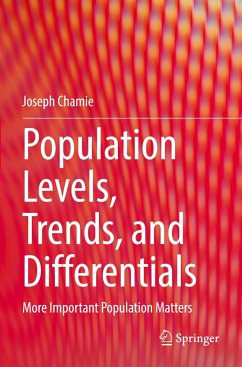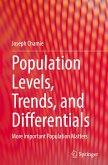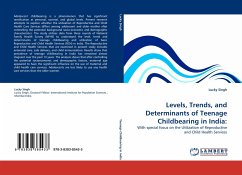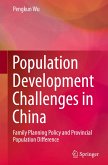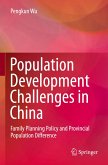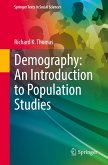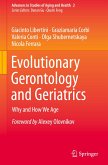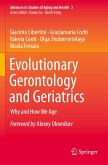- Broschiertes Buch
- Merkliste
- Auf die Merkliste
- Bewerten Bewerten
- Teilen
- Produkt teilen
- Produkterinnerung
- Produkterinnerung
This book is a broad collection of short and concise chapters addressing important issues relating to population levels, trends, and differentials. In addition to traditional population concerns, such as growth, composition, fertility, mortality, and migration, the articles address a broad range of related issues, including climate change, environmental degradation, socio-economic development, and policy development. The articles are concise, focused on specific issues, and presented in a style that avoids technical jargon and is easily understood by a broad range of readers. The articles are…mehr
Andere Kunden interessierten sich auch für
![Population Levels, Trends, and Differentials Population Levels, Trends, and Differentials]() Joseph ChamiePopulation Levels, Trends, and Differentials93,99 €
Joseph ChamiePopulation Levels, Trends, and Differentials93,99 €![Levels, Trends, and Determinants of Teenage Childbearing in India: Levels, Trends, and Determinants of Teenage Childbearing in India:]() Lucky SinghLevels, Trends, and Determinants of Teenage Childbearing in India:33,99 €
Lucky SinghLevels, Trends, and Determinants of Teenage Childbearing in India:33,99 €![Population Development Challenges in China Population Development Challenges in China]() Pengkun WuPopulation Development Challenges in China77,99 €
Pengkun WuPopulation Development Challenges in China77,99 €![Population Development Challenges in China Population Development Challenges in China]() Pengkun WuPopulation Development Challenges in China77,99 €
Pengkun WuPopulation Development Challenges in China77,99 €![Demography: An Introduction to Population Studies Demography: An Introduction to Population Studies]() Richard K. ThomasDemography: An Introduction to Population Studies77,99 €
Richard K. ThomasDemography: An Introduction to Population Studies77,99 €![Evolutionary Gerontology and Geriatrics Evolutionary Gerontology and Geriatrics]() Giacinto LibertiniEvolutionary Gerontology and Geriatrics116,99 €
Giacinto LibertiniEvolutionary Gerontology and Geriatrics116,99 €![Evolutionary Gerontology and Geriatrics Evolutionary Gerontology and Geriatrics]() Giacinto LibertiniEvolutionary Gerontology and Geriatrics108,99 €
Giacinto LibertiniEvolutionary Gerontology and Geriatrics108,99 €-
-
-
This book is a broad collection of short and concise chapters addressing important issues relating to population levels, trends, and differentials. In addition to traditional population concerns, such as growth, composition, fertility, mortality, and migration, the articles address a broad range of related issues, including climate change, environmental degradation, socio-economic development, and policy development. The articles are concise, focused on specific issues, and presented in a style that avoids technical jargon and is easily understood by a broad range of readers. The articles are not only aimed at conveying population information, but also providing important messages for informed policy formulation and program implementation. Among the many issues addressed are human rights, laws, women, gender, climate change, COVID-19 pandemic, ageing, retirement, and abortion. Written in an accessible way, the book will appeal to many general readers wishing to know more about population issues.
Produktdetails
- Produktdetails
- Verlag: Springer / Springer Nature Switzerland / Springer, Berlin
- Artikelnr. des Verlages: 978-3-031-22481-2
- 1st edition 2022
- Seitenzahl: 396
- Erscheinungstermin: 3. Januar 2024
- Englisch
- Abmessung: 235mm x 155mm x 22mm
- Gewicht: 598g
- ISBN-13: 9783031224812
- ISBN-10: 3031224817
- Artikelnr.: 69601275
- Herstellerkennzeichnung Die Herstellerinformationen sind derzeit nicht verfügbar.
- Verlag: Springer / Springer Nature Switzerland / Springer, Berlin
- Artikelnr. des Verlages: 978-3-031-22481-2
- 1st edition 2022
- Seitenzahl: 396
- Erscheinungstermin: 3. Januar 2024
- Englisch
- Abmessung: 235mm x 155mm x 22mm
- Gewicht: 598g
- ISBN-13: 9783031224812
- ISBN-10: 3031224817
- Artikelnr.: 69601275
- Herstellerkennzeichnung Die Herstellerinformationen sind derzeit nicht verfügbar.
Joseph Chamie is an international demographer. He is a former director of the United Nations Population Division at UN Headquarters and later a former research director at the Center for Migration Studies in New York City. Dr. Chamie received his doctoral degree in sociology, majoring in the field of population, from the University of Michigan. He has worked in various regions of the world, specializing primarily in Asia, Africa and the Middle East and has worked in national programs dealing with health issues. He has first-hand experience with the diverse problems of less developed countries as well as the more developed nations. He has lived for several years in a rural Indian village working in health and also resided in areas of civil conflict, having spent six years with the United Nations in Beirut, Lebanon. He has conducted research and taught at universities in the United States and abroad. He was with the United Nations in the field of population and developmentboth overseas and in New York City for more than a quarter century. Among other major duties, he was the deputy secretary-general for the 1994 United Nations International Conference for Population and Development. In addition to completing numerous studies and reports issued under United Nations authorship, he has also written many studies in his own name in such areas as fertility, marriage, population estimates and projections, ageing, urbanization, mortality, gender, international migration, irregular migration and population and development policy. He has been a member of the Council on Foreign Relations, the Population Association of America, the International Union for the Scientific Study of Population and a trustee of the Migration Policy Institute. He currently lives in Portland, Oregon.
Part 1. Age Structure.- 1. 2024: The Historic Reversal of America's Population.- 2. America's Retirement Riddle.- 3. America's Age Tipping Point is Approaching - we're Totally Unprepared.- 4. As Americans Age, a Demographic Crisis Looms.- 5. Caring for The Old.- 6. Population Ageing: An Inescapable Future.- 7. Quitting Work in Retirement? Fuhgeddaboudit.- 8. Raise Retirement Ages.- Part 2. Climate Change.- 9. America's Climate Change Conclusion.- 10. Climate Change Conclusion: Time for Bold Action.- 11. Climate Change Crisis Nonacceptance.- 12. Climate Change Requires Population Stabilization for America.- 13. Climate Change with 8 Billion Humans.- 14. Earth Day to Earth Disaster.- 15. Hamburgers and Climate Change.- 16. The Climate Change Shuffle: Deny, Delay, and Do Nothing.- 17. Too Hot for Climate Change: Limiting Population Growth.- Part 3. Development.- 18. Androids in Human Populations.- 19. As Foes and Allies Rise, America's Downward Spiral Accelerates.- 20. Billionaires 'kvetching' about Population Collapse.- 21. Debunking Demographic Denialism.- 22. Food and People.- 23. Planet Earth into Planet Plastics.- 24. Who's not Voting in America?.- 25. Why Aren't More Women Angry?.- Part 4. Fertility.- 26. Abortion and the Supreme Court: An American Tragedy.- 27. Abortion Decision Felt Worldwide.- 28. America's Views on Abortion Remain Steady - its Laws are a Different Story.- 29. Don't Blame American Women for Fewer Births.- 30. Future Fertility Fantasies.- 31. The Challenges of High Fertility, Rapidly Growing Populations.- Part 5. Growth.- 32. After Years of US Population Growth, it's Time for a Pause.- 33. America's Majority - Minority Confusion.- 34. America's Population Growth Future.- 35. For America's Future Population, how much is too much?.- 36. Is the US Population in Decline? More Ponzi Demography.- 37. No, Henny Penny, America's Demographic Sky is not Falling.- 38. Population Growth Diversity Continuing in the 21st Century.- 39. Population Stabilization, not Growth, is the Key to America's Future.- 40. Slower Population Growth Signals Successes and Benefits.- Part 6. Households.- 41. A Possible Solution to Childcare.- 42. America's Single Parent Families.- 43. Breakdown of Poverty in America is a Mirror to the Nation's Reality.- 44. Dating in a Changing America.- 45. Living alone in America.- 46. The end of Marriage in America?.- 47. Why aren't more American Women and Men in the Labor Force?.- Part 7. International Migration.- 48. America's Immigration Policy Reform: Polemics, Idealism and Slogans.- 49. America's Open Border Policy.- 50. An Open Borders World.- 51. For the Foreseeable Future, Immigration will Fuel U.S. Population Growth.- 52. How Many More Immigrants and who should they be?.- 53. Migration Pawns: Unaccompanied Children.- 54. US Population Stability Requires Immigration - Just not too Much.- Part 8. Irregular Migration.- 55. America's Unauthorized Immigrants have been Left out of the Conversation.- 56. Illegal Immigration Dilemma.- 57. Illegal Immigration: A Global Crisis of the 21st Century.- 58. Smuggler Services for Illegal Immigration.- 59. What should be the Consequences for Illegal Immigration?.- 60. Why the Surprise Over Illegal Immigration that's only Poised to Grow?.- Part 9. Mortality.- 61. America's Pandemic of the Unvaccinated.- 62. America's Unhealthy Lifestyles.- 63. Demographic Impact of Coronavirus Pandemic: An Overview.- 64. Don't Refuse a Covid-19 Vaccine.- 65. One thing Americans can't Deny: The Nation's Low Life Expectancy.- 66. The Dying Children Divide.- 67. The Lives and Deaths of Infants: America's Discouraging Disadvantage.- Part 10. Policies.- 68. America's Experiencing a Binary Sex Transformation.- 69. America's Taxes - Complex, Incomprehensible and Unfair.- 70. Growing Disconnects Between Citizens and Legislators Endanger US Democracy.- 71. It's Time for a Discussion About Life After Being Born in America.- 72. The 'Great Replacement' Theory Rejects History and Reality.- 73. The Most Likely to be in the Jailhouse Now.- 74. The Republicans' Opposition to Elder Support is Decades in the Making.- 75. U.S. Political Divides on Demographics.- Part 11. Refugees.- 76. America's Refugee and Asylum Debate.- 77. Attention America: There's an Asylum Iceberg Dead Ahead.- 78. Rejecting Refugee Realities: Somebody else's Problem.- 79. Right to Asylum: Bye-Bye.- 80. Twilight for the 1951 Refugee Convention.
Part 1. Age Structure.- 1. 2024: The Historic Reversal of America's Population.- 2. America's Retirement Riddle.- 3. America's Age Tipping Point is Approaching - we're Totally Unprepared.- 4. As Americans Age, a Demographic Crisis Looms.- 5. Caring for The Old.- 6. Population Ageing: An Inescapable Future.- 7. Quitting Work in Retirement? Fuhgeddaboudit.- 8. Raise Retirement Ages.- Part 2. Climate Change.- 9. America's Climate Change Conclusion.- 10. Climate Change Conclusion: Time for Bold Action.- 11. Climate Change Crisis Nonacceptance.- 12. Climate Change Requires Population Stabilization for America.- 13. Climate Change with 8 Billion Humans.- 14. Earth Day to Earth Disaster.- 15. Hamburgers and Climate Change.- 16. The Climate Change Shuffle: Deny, Delay, and Do Nothing.- 17. Too Hot for Climate Change: Limiting Population Growth.- Part 3. Development.- 18. Androids in Human Populations.- 19. As Foes and Allies Rise, America's Downward Spiral Accelerates.- 20. Billionaires 'kvetching' about Population Collapse.- 21. Debunking Demographic Denialism.- 22. Food and People.- 23. Planet Earth into Planet Plastics.- 24. Who's not Voting in America?.- 25. Why Aren't More Women Angry?.- Part 4. Fertility.- 26. Abortion and the Supreme Court: An American Tragedy.- 27. Abortion Decision Felt Worldwide.- 28. America's Views on Abortion Remain Steady - its Laws are a Different Story.- 29. Don't Blame American Women for Fewer Births.- 30. Future Fertility Fantasies.- 31. The Challenges of High Fertility, Rapidly Growing Populations.- Part 5. Growth.- 32. After Years of US Population Growth, it's Time for a Pause.- 33. America's Majority - Minority Confusion.- 34. America's Population Growth Future.- 35. For America's Future Population, how much is too much?.- 36. Is the US Population in Decline? More Ponzi Demography.- 37. No, Henny Penny, America's Demographic Sky is not Falling.- 38. Population Growth Diversity Continuing in the 21st Century.- 39. Population Stabilization, not Growth, is the Key to America's Future.- 40. Slower Population Growth Signals Successes and Benefits.- Part 6. Households.- 41. A Possible Solution to Childcare.- 42. America's Single Parent Families.- 43. Breakdown of Poverty in America is a Mirror to the Nation's Reality.- 44. Dating in a Changing America.- 45. Living alone in America.- 46. The end of Marriage in America?.- 47. Why aren't more American Women and Men in the Labor Force?.- Part 7. International Migration.- 48. America's Immigration Policy Reform: Polemics, Idealism and Slogans.- 49. America's Open Border Policy.- 50. An Open Borders World.- 51. For the Foreseeable Future, Immigration will Fuel U.S. Population Growth.- 52. How Many More Immigrants and who should they be?.- 53. Migration Pawns: Unaccompanied Children.- 54. US Population Stability Requires Immigration - Just not too Much.- Part 8. Irregular Migration.- 55. America's Unauthorized Immigrants have been Left out of the Conversation.- 56. Illegal Immigration Dilemma.- 57. Illegal Immigration: A Global Crisis of the 21st Century.- 58. Smuggler Services for Illegal Immigration.- 59. What should be the Consequences for Illegal Immigration?.- 60. Why the Surprise Over Illegal Immigration that's only Poised to Grow?.- Part 9. Mortality.- 61. America's Pandemic of the Unvaccinated.- 62. America's Unhealthy Lifestyles.- 63. Demographic Impact of Coronavirus Pandemic: An Overview.- 64. Don't Refuse a Covid-19 Vaccine.- 65. One thing Americans can't Deny: The Nation's Low Life Expectancy.- 66. The Dying Children Divide.- 67. The Lives and Deaths of Infants: America's Discouraging Disadvantage.- Part 10. Policies.- 68. America's Experiencing a Binary Sex Transformation.- 69. America's Taxes - Complex, Incomprehensible and Unfair.- 70. Growing Disconnects Between Citizens and Legislators Endanger US Democracy.- 71. It's Time for a Discussion About Life After Being Born in America.- 72. The 'Great Replacement' Theory Rejects History and Reality.- 73. The Most Likely to be in the Jailhouse Now.- 74. The Republicans' Opposition to Elder Support is Decades in the Making.- 75. U.S. Political Divides on Demographics.- Part 11. Refugees.- 76. America's Refugee and Asylum Debate.- 77. Attention America: There's an Asylum Iceberg Dead Ahead.- 78. Rejecting Refugee Realities: Somebody else's Problem.- 79. Right to Asylum: Bye-Bye.- 80. Twilight for the 1951 Refugee Convention.

